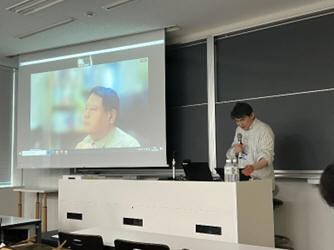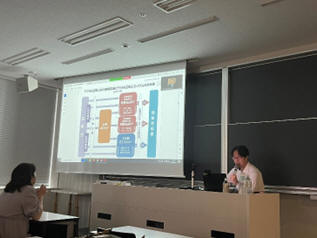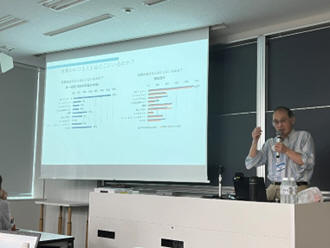活動状況
インターネット政治研究会
過去の研究会
2024年度 第2回インターネット政治研究会(10/26開催)
テーマ:「生成AI時代の米韓における選挙とDisinformation問題」
開催日時: 2024年10月26日(土)午後2時半~午後4時45分
第1部 午後2時半~午後3時半
休憩 午後3時半~午後3時45分
第2部 午後3時45分~午後4時45分
開催方法: Zoom
*報告書作成のため当日レコーディングをしますが、動画公開の予定はございません。
使用言語:第1部は英語のみ、第2部は日本語のみ(通訳はありません。)
申込方法:件名を「2024年度第2回インターネット政治研究会参加申込」とし、氏名、所属・役職・電子メールアドレスを明記の上、次に掲げる申込先メールアドレス宛に10月19日(土)までお申込みください。視聴用のURL等詳細を電子メールにより開催前日までにお知らせいたします。
(申込先電子メールアドレス) kenkyukai@jsicr.jp
第1部「AI in the 2024 American Presidential Election」
【Speaker】Diana Owen (Georgetown University, Professor)
【Abstract】The proliferation of misinformation generated by Artificial Intelligence (AI) may be the most consequential new development in the 2024 election cycle—or it may not. AI’s presence in the election became clear immediately following the September presidential debate when Taylor Swift formally endorsed Kamala Harris after Swift was falsely alleged to be supporting Donald Trump in an AI generated post made to his website. Views about the impact of AI on elections are contested, as systematic research on its effects is limited and difficult to conduct. The mechanics of how AI works and how the content it generates travels through the election information ecosystem are largely unknown. On the one hand is speculation that AI is responsible for a deluge of misinformation that is exacerbating an already dire situation. AI could make election misinformation more pervasive and persuasive, especially as the quality improves. When false content created through generative AI is disseminated through social media, it can potentially influence vote choice, as Taylor Swift feared. AI generated election messages have boomed on Tik Tok, where they are reaching a younger demographic which normally shuns political information. Others contend that fears about AI’s deleterious impact are overblown. Recent studies indicate that the American public’s consumption of election misinformation may be less prevalent that popularly believed and reaches a minority of voters. Voters in the U.S. tend to make up their minds about candidates early, so misinformation may not be an important factor in vote choice. However, the 2024 presidential election is one like no other, and the implications of AI may well be another turning point in electoral history. Researchers will need to develop innovative approaches to tracking the effects of AI and shed light on this novel phenomenon.
【Commentator】Kazuhiro Maeshima (Sophia University, Professor)
【Moderator】 Shoko Kiyohara(Meiji University, Professor)
第2部「2024年韓国の総選挙におけるdisinformationの問題と政治の二極化」
【報告者】高選圭(福島学院大学教授)
【概要】 本報告では、2022年韓国の大統領選挙と2024年の総選挙過程で争点の一つになり、有権者の政治参加や投票決定にも大きな影響力を持っているdisinformationの問題を取り上げる。選挙の時期だけではなく日常の政治の営み中でもフェイクニュースやディープフェイクが誰かによって作られ、流通・拡散されている。実際に、disinformationの問題は、選挙結果にも影響が少なくない。その理由は韓国政治の二極化と関係している。フェイクニュースやディープフェイクの共有・拡散・影響のメカニズムは、理念の二極化だけではなく、メディアの二極化(media polarization)と政治の二極化(political polarization)が相互連動しているからであろう。選挙での事例やそのメカニズム・影響などを分析してみたい。
【コメンテーター】小笠原盛浩(東洋大学・教授)
【司会】清原聖子(明治大学・教授)
開催日時: 2024年10月26日(土)午後2時半~午後4時45分
第1部 午後2時半~午後3時半
休憩 午後3時半~午後3時45分
第2部 午後3時45分~午後4時45分
開催方法: Zoom
*報告書作成のため当日レコーディングをしますが、動画公開の予定はございません。
使用言語:第1部は英語のみ、第2部は日本語のみ(通訳はありません。)
申込方法:件名を「2024年度第2回インターネット政治研究会参加申込」とし、氏名、所属・役職・電子メールアドレスを明記の上、次に掲げる申込先メールアドレス宛に10月19日(土)までお申込みください。視聴用のURL等詳細を電子メールにより開催前日までにお知らせいたします。
(申込先電子メールアドレス) kenkyukai@jsicr.jp
第1部「AI in the 2024 American Presidential Election」
【Speaker】Diana Owen (Georgetown University, Professor)
【Abstract】The proliferation of misinformation generated by Artificial Intelligence (AI) may be the most consequential new development in the 2024 election cycle—or it may not. AI’s presence in the election became clear immediately following the September presidential debate when Taylor Swift formally endorsed Kamala Harris after Swift was falsely alleged to be supporting Donald Trump in an AI generated post made to his website. Views about the impact of AI on elections are contested, as systematic research on its effects is limited and difficult to conduct. The mechanics of how AI works and how the content it generates travels through the election information ecosystem are largely unknown. On the one hand is speculation that AI is responsible for a deluge of misinformation that is exacerbating an already dire situation. AI could make election misinformation more pervasive and persuasive, especially as the quality improves. When false content created through generative AI is disseminated through social media, it can potentially influence vote choice, as Taylor Swift feared. AI generated election messages have boomed on Tik Tok, where they are reaching a younger demographic which normally shuns political information. Others contend that fears about AI’s deleterious impact are overblown. Recent studies indicate that the American public’s consumption of election misinformation may be less prevalent that popularly believed and reaches a minority of voters. Voters in the U.S. tend to make up their minds about candidates early, so misinformation may not be an important factor in vote choice. However, the 2024 presidential election is one like no other, and the implications of AI may well be another turning point in electoral history. Researchers will need to develop innovative approaches to tracking the effects of AI and shed light on this novel phenomenon.
【Commentator】Kazuhiro Maeshima (Sophia University, Professor)
【Moderator】 Shoko Kiyohara(Meiji University, Professor)
第2部「2024年韓国の総選挙におけるdisinformationの問題と政治の二極化」
【報告者】高選圭(福島学院大学教授)
【概要】 本報告では、2022年韓国の大統領選挙と2024年の総選挙過程で争点の一つになり、有権者の政治参加や投票決定にも大きな影響力を持っているdisinformationの問題を取り上げる。選挙の時期だけではなく日常の政治の営み中でもフェイクニュースやディープフェイクが誰かによって作られ、流通・拡散されている。実際に、disinformationの問題は、選挙結果にも影響が少なくない。その理由は韓国政治の二極化と関係している。フェイクニュースやディープフェイクの共有・拡散・影響のメカニズムは、理念の二極化だけではなく、メディアの二極化(media polarization)と政治の二極化(political polarization)が相互連動しているからであろう。選挙での事例やそのメカニズム・影響などを分析してみたい。
【コメンテーター】小笠原盛浩(東洋大学・教授)
【司会】清原聖子(明治大学・教授)
2024年度 第1回インターネット政治研究会開催報告
※2024年度春季情報通信学会大会内にて開催
■テーマ::日本における偽・誤情報対策の現状と課題
■日時:2024年6月29日(土)
第1回研究会は、2024年度春季(第50回)情報通信学会内で開催され、行政の担当者と研究者の立場から、それぞれ充実したプレゼンテーションが行われました。90分の時間制約があったので討論者からの質問・コメントに対して報告者が答えたところで終了時間を迎えたことは若干残念でしたが、終了後に会場で報告者と多くの参加者が名刺交換や意見交換を行うことができ、対面開催ならではの利点も感じられました。報告者から許可を得られたため、報告スライドを公開します。
【研究会の様子】

■報告者1: 恩賀一 (総務省情報流通行政局情報流通適正化推進室室長)
報告タイトル: インターネット上の偽・誤情報に関する総務省の主な取組
[報告1スライド公開用]
【第1報告の様子】

■報告者2: 田中辰雄 (横浜商科大学教授/国際大学GLOCOM主幹研究員)
報告タイトル: もう一つの偽情報対策―流言は知者に止まる
[報告2スライド公開用]
【第2報告の様子】

■討論者
前嶋和弘(上智大学)、小笠原盛浩(東洋大学)
■司会者
清原聖子(明治大学)
■テーマ::日本における偽・誤情報対策の現状と課題
■日時:2024年6月29日(土)
第1回研究会は、2024年度春季(第50回)情報通信学会内で開催され、行政の担当者と研究者の立場から、それぞれ充実したプレゼンテーションが行われました。90分の時間制約があったので討論者からの質問・コメントに対して報告者が答えたところで終了時間を迎えたことは若干残念でしたが、終了後に会場で報告者と多くの参加者が名刺交換や意見交換を行うことができ、対面開催ならではの利点も感じられました。報告者から許可を得られたため、報告スライドを公開します。
【研究会の様子】

■報告者1: 恩賀一 (総務省情報流通行政局情報流通適正化推進室室長)
報告タイトル: インターネット上の偽・誤情報に関する総務省の主な取組
[報告1スライド公開用]
【第1報告の様子】

■報告者2: 田中辰雄 (横浜商科大学教授/国際大学GLOCOM主幹研究員)
報告タイトル: もう一つの偽情報対策―流言は知者に止まる
[報告2スライド公開用]
【第2報告の様子】

■討論者
前嶋和弘(上智大学)、小笠原盛浩(東洋大学)
■司会者
清原聖子(明治大学)

